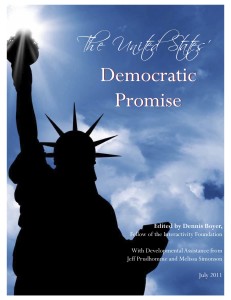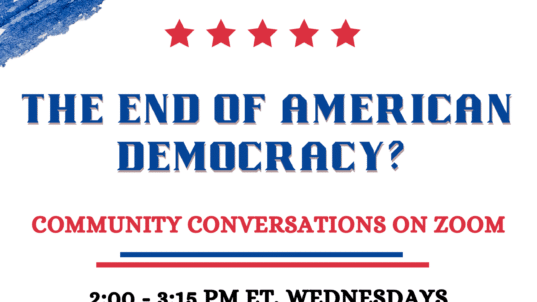Interactivity Foundation discussion reports are based on the premise that there are deliberative benefits to be derived from the discussion of our crafted (yes, I see both the management of the originating project panels and the rendering of their ideas into policy possibilities as Craft) conceptual possibilities. Analysis of our survey results by colleagues Adolf Gundersen and Sue Lea bear out a number of these deliberative benefits. My own sense of the “civic gain” among participants in discussions of our reports is that it enlarges thinking about the report policy areas in multiple ways and more generally sensitizes them to the different thinking that lies behind various policy appro aches.
aches.
What I have become less certain of over time is the accessibility of our reports to general citizen audiences. Some reports are more accessible than others, some groups of discussants are more adept than others, and some discussion facilitators are more skilled at adjusting the level of the conversation to the discussants than others.
Many of my colleagues have probably tired of my references to a deliberative continuum. I do see IF’s work as placed very close to the beginning of the continuum, serving as useful starting points for governance discussions in ways that provoke the imagination and enlarge the sense of the possible. But I have started to consider whether the usefulness of IF reports could be enhanced by additional preparatory steps.
My thinking on this matter has been influenced by two different sets of public discussion experiences. The first set of experiences arose from my own and other facilitator experiences with my report The United States’ Democratic Promise. The second set of experiences arose from my test discussions of IF President Dr. Jack Byrd’s developmental drafts of exploratory discussion situations focused on “fairness” and “freedom and responsibility”.
Democratic Promise was developed by project panelists who I found particularly thoughtful and intensely mindful of report accessibility issues. The group sense was that the report should be accessible to anyone with K-12 American Civics familiarity (basic understanding of branches of government, federal system, and general history). Despite those good intentions, this report has proved difficult to facilitate and discuss in many settings. The difficulties seem to stem from a number of sources, but two dominate: low information and bad information. It would appear that many members of the public are barely acquainted with the basics of American government. More troubling, perhaps, are widespread beliefs that are conflated with “facts” (insistence on Constitutional provisions that do not exist in that document, reliance on historical foundations that are fanciful, etc). On the other hand, there have been a number of discussions of Democratic Promise that count as successful, including some in the classroom, at conferences on public participatory themes, and one facilitated by colleague Nneka Edwards that took the approach of drawing out discussants on the values and goals behind the possibilities.
This brings me back to Jack Byrd’s draft exploratory discussion situations. As I understand them, they represent preliminary efforts to find common themes among existing IF reports and prompt discussion of foundational attitudes among discussants that they may then apply to a number of hypothetical (but realistic) social settings and problems. The materials on “fairness” and “freedom and responsibility” worked well in my experience, with low information evaporating as a concern and bad information reduced as a factor in argument and disruption of conversation flow. I would also venture to say that starting conversations with values and beliefs also seems to create a more gentle and supportive discussion environment in which there is less defensiveness among participants about gaps in their knowledge and questions about their opinions.
So where does that leave me with my notion of the deliberative continuum? Are there more steps needed before the IF “starting points”? Maybe not if we are discussing Democratic Promise in college level political science course. But probably so, if discussion involves citizens who have not paid much attention to the policy concerns of IF reports. Since IF is also considering re-writes and revisions of its reports it may also be worthwhile to consider how preparatory or supplementary material might fit with updated reports. This integration of additional material and the reports might be accomplished in one or more of the following ways:
- Report revisions could include underlying values and goals questions and exploratory situations in the report.
- Reports could include brief summaries of pertinent facts and background that establish a stronger context for discussion of policy possibilities.
- Report discussions could be preceded by brief “tutorials” that provide additional civic learning about the policy area of concern.
- Reports could be bundled in related groups, supplemented with exploratory questions and situations, strengthened with tutorial outlines, and presented as discussion-based course materials for academic and civic education purposes.
The above items may help address some of the problems of discussing complex policy issues with low information participants. But they would require some re-thinking of how we accomplish the IF mission and whether we are in a position to enlarge the IF niche on the deliberative continuum.



